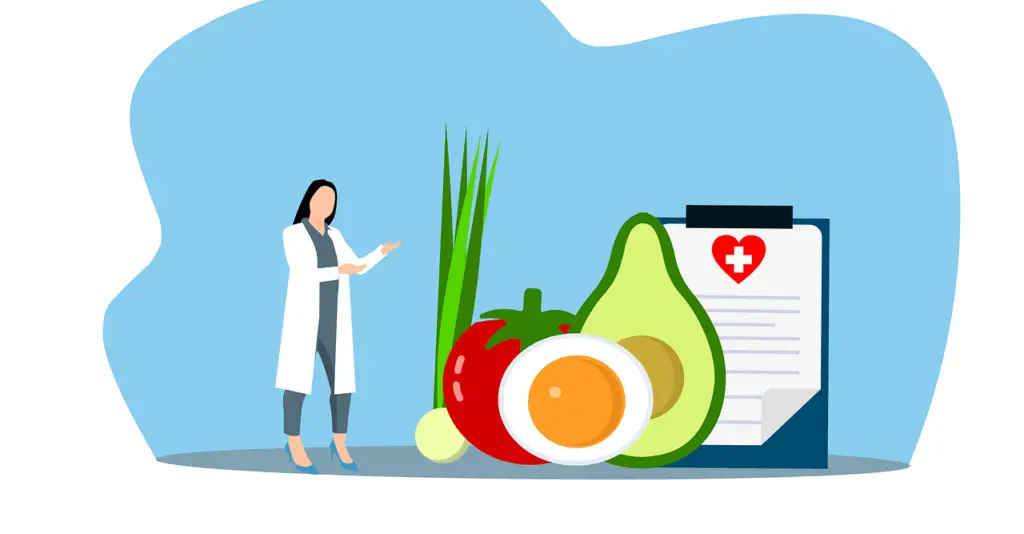Table of Contents
ToggleIntroduction
An important factor in our general health and well-being is our diet. It’s essential to understand how our dietary needs differ from person to person to tailor our diets accordingly. This blog post will provide an in-depth exploration of healthy eating for specific dietary needs, discussing common restrictions and needs, and offering key considerations for navigating them.
Role of Diet in Overall Health

A. The Impact of Diet on Overall Health
Diet is not just about satisfying our taste buds; it has a profound impact on our overall health. Our bodies get the nutrients they need from the food we eat to function at their best. By making informed dietary choices, we can enhance our energy levels, support our immune system, and prevent the onset of chronic diseases.
B. Personalized Diets for Optimal Health
It’s important to recognize that each individual has unique dietary needs. There’s just no such thing as a one-size-fits-all nutrition plan. By tailoring our diets to align with our specific needs, we can achieve superior health outcomes and truly thrive.
C. Overview of Common Dietary Restrictions and Needs
Understanding common dietary restrictions and needs is vital when it comes to maintaining a healthy eating plan. Let’s explore some of these restrictions and needs in more detail.
Key Considerations for Healthy Eating with Dietary Restrictions

A. Navigating Food Allergies and Intolerances
Identifying and Managing Food Allergies
Food allergies can pose significant challenges when it comes to healthy eating. It’s important to identify allergens through diagnostic testing or elimination diets. Once identified, it becomes easier to manage food allergies by avoiding trigger foods and finding suitable alternatives.
Dealing with Food Intolerances and Sensitivities
Unlike allergies, food intolerances and sensitivities may not have immediate and severe reactions. Constipation and stomach problems can result from these conditions. Individuals with intolerances should identify trigger foods, eliminate or reduce their intake, and work with a healthcare professional or registered dietitian for guidance.
Finding Suitable Alternatives and Substitutions
When faced with dietary restrictions, finding suitable alternatives and substitutions is crucial. For example, substituting cow’s milk with non-dairy alternatives like almond milk or soy milk can accommodate lactose intolerance or a vegan diet. Experimenting with various options and seeking advice from health professionals can lead to delicious and nutritious results.
B. Maintaining a Healthy Diet as a Vegetarian or Vegan
Building a Balanced Plant-Based Diet
Vegetarian and vegan diets have gained popularity in recent years due to ethical, environmental, and health concerns. To maintain a healthy plant-based diet, individuals should include a variety of fruits, vegetables, whole grains, legumes, nuts, and seeds. This ensures a sufficient intake of essential nutrients while providing a diverse range of flavors and textures.
Ensuring Sufficient Intake of Essential Nutrients
One common concern about vegetarian and vegan diets is the potential for nutrient deficiencies. To address this concern, individuals should focus on consuming sources rich in iron, calcium, vitamin B12, omega-3 fatty acids, and protein. For example, incorporating foods like dark leafy greens, fortified plant-based milk, nutritional yeast, chia seeds, and tofu can help meet these nutritional needs.
Addressing Common Concerns for Vegetarians and Vegans
Vegetarians and vegans often face questions and concerns from others about their dietary choices. It’s important to address these concerns and educate others about the benefits of plant-based diets. By sharing personal experiences, highlighting the environmental impact, and promoting compassion for animals, individuals can inspire others to embrace these dietary choices as well.
C. Managing Diabetes Through Healthy Eating Choices
Understanding the Relationship Between Diet and Diabetes
A healthy diet is essential for properly managing diabetes. By monitoring carbohydrate intake, selecting low glycemic index foods, and practicing portion control, individuals can help regulate blood sugar levels and prevent complications related to diabetes.
Developing a Diabetes-Friendly Meal Plan
Creating a diabetes-friendly meal plan involves choosing foods that promote stable blood sugar levels. This includes selecting whole grains, lean proteins, healthy fats, and a variety of fruits and vegetables. Consulting with a registered dietitian who specializes in diabetes management can provide invaluable guidance and support.
Controlling Blood Sugar Levels with Smart Food Choices
Making smart food choices can help individuals with diabetes control their blood sugar levels. For example, opting for whole fruits instead of juices, selecting complex carbohydrates over refined options, and consuming balanced meals can aid in maintaining stable blood sugar levels throughout the day.
D. Meeting Nutritional Needs during Pregnancy and Lactation

Ensuring Adequate Nutrient Intake for Optimal Health
Nutrition plays a key role in supporting the health of both the mother and the developing baby during pregnancy and lactation. Pregnant individuals need to focus on consuming a well-balanced diet that includes a range of macronutrients, vitamins, and minerals.
Addressing Common Nutritional Concerns During Pregnancy
During pregnancy, certain nutrients become even more critical for the healthy development of the baby. Iron, calcium, folate, and omega-3 fatty acids are among the essential nutrients that should be emphasized. Prenatal supplements may also be recommended to meet the increased nutrient demands.
Breastfeeding and Nourishing Both Mother and Baby
Adequate nutrition is vital while breastfeeding to ensure the production of nutrient-rich breast milk. A lactating individual needs to consume enough calories and maintain a balanced diet to support both their health and the optimal growth of their baby. Seeking guidance from a healthcare professional can provide reassurance and help navigate specific dietary concerns.
E. Effective Diet Strategies for Weight Management and Healthy Aging
Crafting a Balanced Diet Plan for Weight Loss
Weight management goes beyond simply counting calories. A balanced diet plan involves incorporating nutrient-dense foods, practicing portion control, and incorporating regular physical activity. By focusing on sustainable lifestyle changes rather than quick fixes, individuals can achieve long-term success in weight management.
Maintaining a Nutrient-Rich Diet for Healthy Aging
As we age, our nutrient requirements change, and maintaining a nutrient-rich diet becomes even more crucial. Including a variety of fruits, vegetables, whole grains, lean proteins, and healthy fats can provide the necessary vitamins, minerals, and antioxidants to support healthy aging and prevent age-related diseases.
Incorporating Exercise and Lifestyle Modifications for Success
While diet is important, incorporating regular physical activity and lifestyle modifications is equally vital for weight management and healthy aging. Engaging in enjoyable physical activities, reducing sedentary behavior, and prioritizing self-care can enhance overall well-being and contribute to a long and healthy life.
Summary and Key Takeaways
In conclusion, healthy eating for specific dietary needs requires an understanding of individual requirements and restrictions. By tailoring our diets accordingly, we can strike a balance between nutrition and taste, ensuring optimal health and well-being. Seek professional guidance, embrace personal choices, and embark on a journey of delicious, nutritious, and fulfilling eating habits.
A. Importance of Tailoring Diet to Individual Needs
Understanding and catering to individual dietary needs is crucial for optimal health and well-being. By recognizing and addressing specific dietary restrictions and requirements, individuals can craft a personalized eating plan that supports their unique needs.
B. Balancing Nutrition and Deliciousness for Optimal Health
While dietary restrictions may pose challenges, it’s important to strike a balance between nutrition and taste. By exploring suitable alternatives, incorporating a variety of flavors, and experimenting with new recipes, individuals can enjoy delicious meals that meet their dietary needs.
C. Seeking Professional Guidance for Personalized Nutrition Plans
When navigating specific dietary needs, it’s beneficial to seek guidance from healthcare professionals or registered dietitians. These experts can provide personalized nutrition plans, address concerns, and support individuals in achieving their health goals.
Frequently asked questions
Q1. What are the most common food allergies and how can they be managed through diet?
The most common food allergies include peanuts, tree nuts, shellfish, fish, eggs, milk, wheat, and soy. These allergies can be managed through strict avoidance of trigger foods, proper label reading, and finding suitable alternatives that provide necessary nutrients.
Q2. Can a vegetarian or vegan diet provide all the necessary nutrients for optimal health?
Yes, a well-planned vegetarian or vegan diet can provide all the necessary nutrients for optimal health. It requires adequate knowledge, variety, and consideration of key nutrients like protein, calcium, iron, vitamin B12, and omega-3 fatty acids.
Q3. How can I control my blood sugar levels through diet if I have diabetes?
Controlling blood sugar levels involves monitoring carbohydrate intake, selecting low glycemic index foods, practicing portion control, and incorporating regular physical activity. Consulting with a registered dietitian who specializes in diabetes is highly recommended.
Q4. What essential nutrients are needed during pregnancy, and how can they be obtained through diet?
Essential nutrients during pregnancy include folate, iron, calcium, omega-3 fatty acids, and vitamin D. A well-balanced diet that includes fruits, vegetables, whole grains, lean proteins, and dairy products can help meet these nutritional needs. Prenatal supplements may also be recommended.
Q5. Is it possible to lose weight without compromising nutritional intake?
Yes, it is possible to lose weight without compromising nutritional intake. By focusing on a balanced diet rich in whole foods, practicing portion control, and incorporating regular physical activity, individuals can achieve sustainable weight loss while ensuring optimal nutrient intake.
Q6. Are dietary needs different for older adults, and if so, what should be emphasized in their diet?
Yes, dietary needs change as we age. Older adults should emphasize a nutrient-rich diet that includes foods rich in calcium, vitamin D, vitamin B12, fiber, and antioxidants. A balanced diet, regular physical activity, and adequate hydration are key to healthy aging.

